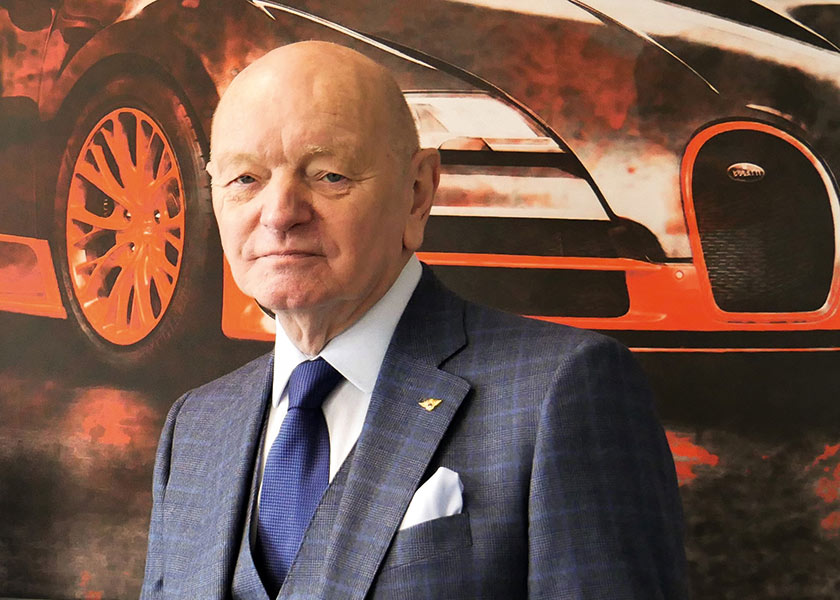Decarbonisation of the transport sector – Is the direction right?
Interview with Armin Gehl, Managing Director of autoregion e.V., Saarbrücken.
Are we on the right track towards decarbonisation of the transport sector or do the promises of politics prove to be too ambitious in the concrete implementation? Have we backed the right horse, especially when it comes to alternative drive systems, or are we in danger of missing out on important developments and technological opportunities? A discourse on possibilities and concrete political course-setting as a contribution to climate change in the transport sector.
Question: In its coalition agreement, the “traffic light” coalition has presented an ambitious programme for the comprehensive decarbonisation of the transport sector. For example, only CO2-neutral passenger cars are to be registered in Germany before 2035. How do you see this ambitious goal being realised?
Armin Gehl: In principle, there is nothing fundamentally wrong with the objectives set out in the coalition agreement. However, we have to admit that the realisation is not successful in all areas, or that the wrong political course is being set, or that certain areas are not being worked on with the necessary intensity.
Question: Where do you see the course being set, that points in the wrong direction?
Armin Gehl: Even though the Federal Minister of Transport is committed to the principle of technology openness in his public statements, we see a clear primacy in the political implementation of the promotion of e-mobility at the expense of other alternative forms of propulsion such as hydrogen or synthetic fuels – so-called e-fuels. We also consider the premature political stigmatisation of the internal combustion engine, which, as a piston engine, according to all experts still has considerable environmentally neutral development and innovation potential in the use of CO2-free fuels, to be a step in the wrong direction.
Question: What concrete political measures support your view?
Armin Gehl: The prioritisation of e-mobility is already expressed in the available funding volume alone. So far, the purchase of electric cars has been subsidised with a volume of 4.6 billion euros through the so-called environmental bonus – and the trend is rising. For the installation of private charging stations for electric cars, the funding volume was recently increased to 400 million. For the research, testing and production of synthetic fuels, only about 100 million euros in government funding is available. This is a blatant disproportion and in no way does justice to the potential importance of e-fuels and urgently needs to be corrected.
Question: Is the announcement by Economics Minister Habeck to stop or significantly reduce subsidies for hybrid vehicles a step in the right direction?
Armin Gehl: The way out of the disproportionate state support cannot be to reduce, discontinue or expand support for drive systems that makes sense in itself, in favour of or at the expense of other drive systems. Along with other drive systems, e-mobility is a fundamentally important component of our decarbonisation strategy. And the hybrid drive – the combination of combustion and electric drive – represents an important variant alongside the pure battery-electric drive, at least as a bridging technology. Particularly against the backdrop of a charging infrastructure that is still inadequate, especially in rural areas, hybrid vehicles represent a sensible alternative to the purely electric vehicle. The driver of such a vehicle does not need to worry about being stranded because of insufficient range or the lack of charging stations.
However, discontinuing or reducing subsidies for hybrid vehicles also means further stigmatising the piston engine. Already in the past, the piston engine – at that time still using fossil fuels – has proven its enormous development potential in terms of consumption reduction and environmental friendliness. And this potential is far from exhausted, especially with non-fossil fuels. Piston engine technology is an extremely important structural element of our automotive supply industry in particular. The creeping disappearance of piston engine development and production means a loss of jobs that should not be underestimated in an industrial sector that continues to be internationally recognised for its high technological level. In the Saarland alone, we are talking about an order of magnitude of about 40,000 jobs that are directly dependent on combustion engine technology.
Question: Why is the expansion of the charging infrastructure so slow?
Armin Gehl: Obviously, the original target was too ambitious. But nevertheless, the expansion of the charging infrastructure is making remarkable progress. Germany currently has around 28,000 public charging stations. However, the registration rate of e-vehicles is rising faster than the number of charging stations. The increasing number of private charging stations is having a positive effect – not least due to the intensive state subsidies. The disparity between urban conurbations and more rural regions, as well as the insufficient number of fast charging stations in the countryside, continues to be a disadvantage. There is a clear backlog demand for so-called charging hubs for heavy goods traffic along the most important long-distance transport routes. Incidentally, the same applies to the provision of hydrogen filling stations for truck traffic. Here, our neighbouring countries are several steps ahead of us.
Question: In which development fields do you see the greatest need for measures to further decarbonise our automotive transport sector?
Armin Gehl: Besides the expansion of hydrogen technology, I see first and foremost the development of e-fuels. In any scenario for phasing out combustion technology, the fate of 1.2 billion existing vehicles worldwide and around 67 million in Germany with classic combustion engines remains open. To solve this problem, the development and widespread introduction of synthetic fuels is almost inevitable. We must succeed in producing sufficient quantities of synthetic fuels in an economically viable and climate-neutral manner. This would allow a large proportion of existing vehicles to continue to be used with little retrofitting. The production of electric vehicles with environmentally harmful battery technology could be at least partially replaced by the production of vehicles with environmentally friendly, CO2-neutral combustion technology. This would also secure the high technological level of the internal combustion engine, which is important for international competition, including the jobs that depend on it for our automotive and supplier industry. The infrastructure issue would also appear in a completely different light. The existing filling station network would be available for synthetic fuels and the cost-intensive expansion of the charging infrastructure, especially in rural regions, could be at least partially dispensed with. To politically ignore all these advantages of e-fuels is simply foolish.
Question: Do you also see positive political aspects that make the use of e-fuels more attractive?
Armin Gehl: The decision of the EU Transport Committee to count “green” fuels in the CO2 fleet regulation in future can be seen as an extremely positive signal. This decision is a clear rejection of a ban on new registrations of internal combustion engines from 2035. If the EU Parliament approves this decision – which would be highly desirable – it means that the classic piston engine would not be at the end of its development. This would be a clear message to all those who, for political-dogmatic reasons, have been trying to bring about the end of this type of engine for a long time.
Question: The war in Ukraine will – at least in the medium and long term – lead to a fundamental transformation of our energy supply systems. What consequences will this have for the decarbonisation of transport?
Armin Gehl: The consequences of this conflict are currently very difficult to assess in terms of their concrete impact – also in view of the ongoing hostilities. Nevertheless, certain tendencies are certainly discernible. It can certainly be ruled out that there will be a renaissance of fossil fuels. The reduction of dependence on Russian energy supplies will lead to a significant expansion of renewable energies. This will increase the pressure for a faster decarbonisation of the transport sector. The transformation of the energy sector will continue to lead to a change in the price structure of the various energy sources among themselves and thus cast a different light on the economic viability of alternative forms of propulsion such as e-fuels and hydrogen. This will open up new opportunities and possibilities for alternative drive types.
Mr Gehl, thank you for the interview.
The interview was conducted by Dr Rudolf Müller, freelance journalist, Mainz.
autoregion e.V.
Franz-Josef-Röder-Straße 9
66119 Saarbrücken
Tel. +49 (0)681 9520 596
Handy +49 (0)174 977 97 48
Fax +49 (0)681 94 888 61
info@autoregion.eu







